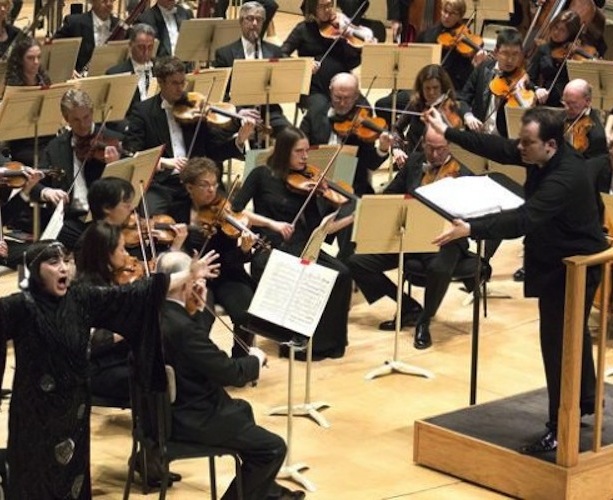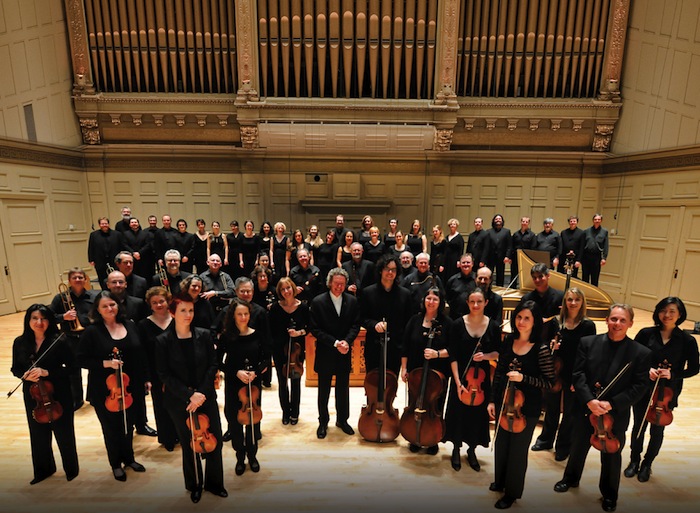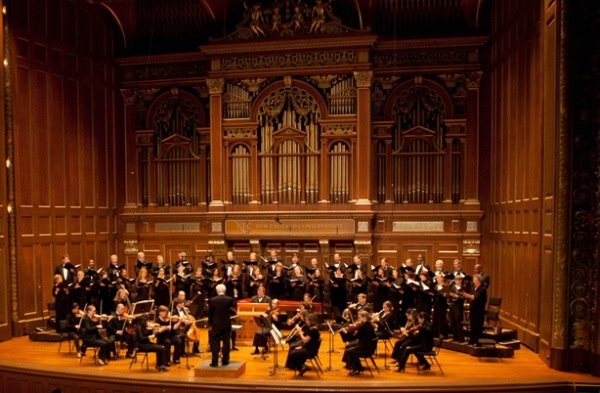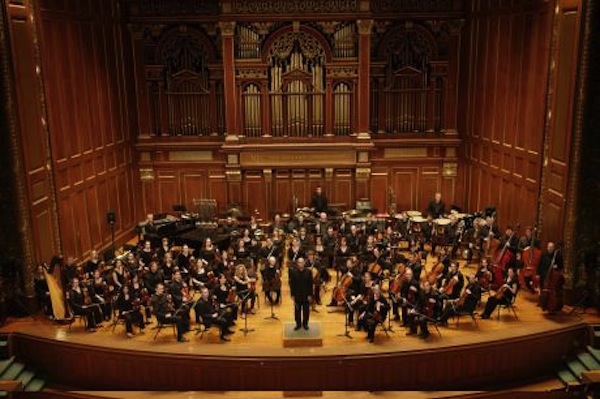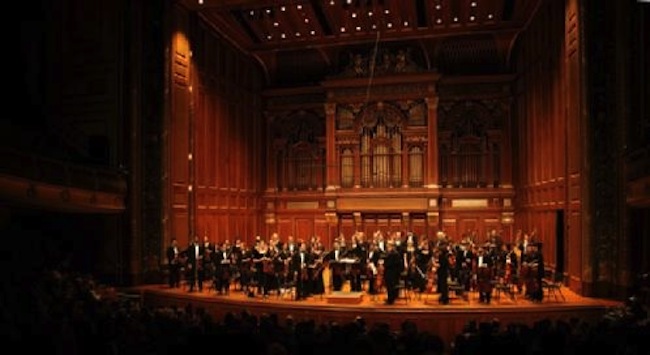Classical Music Season Preview 2014-2015: Adhering to the Safe, With Exceptions
There’s a powerful attachment to conventional repertoire among the city’s many orchestras, through are there things to look forward to. Here is a guide to what’s coming up.
By Jonathan Blumhofer
Boston is a city in which many orchestras, remarkably, can thrive. Even taking into account the sad demise of the Discovery Ensemble this summer, there are at least half-a-dozen major groups and some smaller ones fully deserving attention. Between them this year are a couple striking duplications of repertoire – not as bad as last season’s double-, triple-, and, once, quadruple-repetitions of all things Beethoven, thank goodness – and programs, with a few exceptions, generally adhere to safe, familiar names and pieces. Still, there are things to look forward to. Below is a birds-eye survey of the 2014-15 orchestral season and some commentary on it.
*****
The biggest news, locally, is the arrival of Andris Nelsons as the Boston Symphony Orchestra’s (BSO) new music director. Looking at his ten weeks of subscription concerts this year, the first thing that jumps out is the fact that, for better or worse, Nelsons isn’t James Levine. Say what you will about Levine’s penchant for 20th- (and 21st-) century Modernism – and there’s much to be said, both positive and negative – at least there was no doubting that he had big ideas about what the BSO should be doing and he wasn’t afraid to ruffle some feathers to liven things up.
Nelsons isn’t nearly as assertive. His programs stick largely to canonical offerings, including several pieces that have been turning up on BSO programs with obnoxious frequency over the last five years. If you like the parade of classical music’s fifty-or-so greatest hits, you’ll find lots to love in his first BSO season: Bruckner’s Seventh, Sibelius’s Second, and Tchaikovsky’s Sixth Symphonies all return. Brahms Variations on a Theme of Haydn is back, as is plenty of Mozart (though Nelsons, himself, is only conducting two of the five Mozart piano concertos on the season schedule). Other conductors bring Schubert, heaps of more Brahms (including the Deutsches Requiem, First Symphony, Piano Concerto no. 1, and Violin Concerto), some Haydn, Richard Strauss, more Mozart, and Schumann, among others. None of it’s bad, of course, in and of itself. It’s just that most of it is presented in the same tired, uninspired way that’s been a hallmark of BSO programming for quite a while now.
Among the things to look forward to during Nelsons’ weeks in town are the Opening Night Gala on September 27th (also starring Nelsons’ wife, soprano Kristine Opolais, and tenor Jonas Kaufman) and two programs in November. The first (from the 13th-18th) features music by Tchaikovsky and Stravinsky, plus the American premiere of Brett Dean’s Dramatis personae (Nelsons’ frequent collaborator, trumpeter Håkan Hardenberger, is the soloist). The second (November 20th-22nd) showcases Yo-Yo Ma in Prokofiev’s Symphony-Concerto and includes a new piece by Eric Esenvalds, a reprise of John Harbison’s witty “Koussevitzky Said…,” and Rachmaninoff’s The Bells. In March (26th-31st), Nelsons returns to conduct a new work for organ and orchestra by Michael Gandolfi on a program with Mahler’s awesome Sixth Symphony and, in April, directs Shostakovich’s mighty Symphony no. 10 (2nd-4th) and Gunther Schuller’s Dreamscape (9th-14th).
If only the whole season could have been as consistently inventive. Yes, there’s a sense that Nelsons needs to introduce himself and his repertoire to Symphony Hall audiences, and the Strauss chestnuts he’s conducting (Don Quixote in January and Ein Heldenleben in April; Christoph von Dohnányi leads more Strauss in March) are fun to trot out every decade or so (plus, Bartók’s Miraculous Mandarin is never unwelcome). But for those hoping Nelsons would start off his tenure with a sense of artistic purpose along the lines of Alan Gilbert or Gustavo Dudamel, well, this season marks, in some regards, a rather lackluster beginning.
For the season’s truly engaging offerings, you have to look to a series of guests coming between late January and early March. First, Tugan Sokhiev makes his BSO debut conducting Berlioz and Rimsky-Korsakov and Johannes Moser appears as the soloist in Camille Saint-Saëns’ Cello Concerto no. 1 (January 22nd-24th). Then, Asher Fisch and Julian Rachlin team up in Prokofiev’s Violin Concerto no. 2 (January 29th-31st), on a program that also includes Avner Dorman’s Astrolatry and Schumann’s “Spring” Symphony. A couple of weeks later (February 12th-14th), Vladimir Jurowski leads the American premiere of Harrison Birtwistle’s Responses: Of sweet disorder and the carefully careless (featuring pianist Pierre-Laurent Aimard) plus a set of pieces by Anatol Liadov and Stravinsky’s The Firebird. Stéphane Denève, one of the BSO’s best guest conductors of late, follows Jurowski with an exploration of music written in the 1920s and ‘30s by Stravinsky, Poulenc, Milhaud, and Prokofiev (February 19th-21st). Then comes Charles Dutoit, with a two-week residency that kicks off with Stravinsky’s Dumbarton Oaks, Debussy’s Images, and Brahms’s Violin Concerto (February 26th-March 3rd). Julia Fischer is the soloist. To cap things off, on March 5th and 7th, Dutoit conducts the first BSO performances of Karol Szymanowski’s opera King Roger.
Other guest conductors include Marcello Lehninger (September 18th-20th), Christian Zacharias (October 9th-11th), Thierry Fischer (October 16th-21st), Bramwell Tovey (October 23rd-25th), Juanjo Mena (October 30th-November 4th), Leonidas Kavakos (November 29th-30th), Christoph von Dohnányi (two weeks, March 12th-21st), and Bernard Haitink (two weeks, April 23rd-May 2nd).
*****
The other big news of the season concerns the city’s – and the nation’s – oldest performing arts ensemble, the Handel and Haydn Society (H&H), which this year commemorates its bicentennial. Artistic director Harry Christophers kicks off the celebration with a program of late-Baroque favorites (October 10th and 12th), including Handel’s celebrated anthem, Zadok the Priest, and the Music for the Royal Fireworks; Bach’s Singet den Herrn; and “Summer” from Vivaldi’s Four Seasons. Christophers is back to lead H&H’s annual Messiah performances (November 28th-30th), as well as an all-Haydn concert (January 23rd and 25th), Bach’s St. Matthew Passion (March 27th and 29th), and Haydn’s The Creation (May 1st and 3rd).
Leaders and conductors of other concerts include concertmaster Aisslinn Nosky (October 31st and November 2nd), directing and performing concerti by Vivaldi, Corelli, and Tartini’s Devil’s Trill Sonata; Scott Allan Jarrett conducting “A Bach Christmas” (December 18th and 21st); and Richard Egarr leading Mozart’s Weisenhaus Mass and Beethoven’s Symphony no. 1. Grant Llewellyn, H&H’s former music director, comes to town in March (the 6th and 8th) to conduct Mendelssohn’s Elijah. Capping off the season is a special concert on June 18th, again led by Christophers, that features a broad canvass of choral music, from Palestrina and Handel to Arvo Pärt and James MacMillan, which is being held in conjunction with the 2015 Chorus America conference. In all, it’s an appropriately busy year for H&H with a bit more choral singing than usual – which is great news for those who thrill to the sound of, arguably, the finest of Boston’s many excellent choral ensembles.
*****
Complementing H&H’s season, Boston’s other major period ensemble, Boston Baroque, offers a host of major Baroque scores between November and April. First up is Claudio Monteverdi’s Vespers of 1610, featuring soloists Yulia Van Doren, Teresa Wakim, Thomas Cooley, and Aaron Sheehan (November 14th and 15th). This is followed a month later by a pair of Messiah performances (December 12th and 13th). The ensemble’s annual New Year’s Eve/Day concerts this year consist of Dominico Cimarosa’s Il maestro di capella and arias and duets by Mozart with soloists Andrew Garland and Sara Heaton (December 31st and January 1st). At the end of February, the tenor John Mark Ainsley joins Boston Baroque for Bach’s St. John Passion (February 27th and 28th); the cast also includes the extraordinary Nicholas Phan. Closing the season in April is another strong cast presenting a concert performance of Handel’s opera, Agrippina. Susanna Phillips sings the title role and is joined by Amanda Forsythe, Krista River, and Kevin Deas, among others (April 25th and 26th).
*****
Straddling repertoire old, more recent, and brand new is the Cantata Singers. Their season begins on November 8th with two Bach cantatas (BWV 77 and 195a) plus the world premiere of Elena Ruehr’s Eve. On January 24th and 31st the ensemble tackles Rachmaninoff’s Vespers at Houghton Chapel at Wellesley. If you missed one of last year’s surprise popular pieces, Beethoven’s Elegiac Song (both the BSO and Boston Baroque programmed it, separately), you can hear it on March 8th, during the Cantata Singers third concert. Mozart’s C minor Mass and Haydn’s Symphony no. 86 fill out that program. The season finale returns to music of the Baroque era, with one piece each by J.S. Bach and Jan Dismas Zelenka (May 10th).
*****
Fans of chamber, jazz, and folk music should be flocking to the Celebrity Series’ many, varied offerings this season. Orchestra lovers should, too, even if two of the three ensembles the Series is bringing to town this year duplicate some big pieces being played by local groups. The high point of visiting orchestras is the San Francisco Symphony, which comes to Symphony Hall on November 16th with Michael Tilson Thomas on the podium. MTT conducts a program that includes music by Liszt, Samuel Carl Adams (son of John), and Ravel. Gil Shaham is the soloist in Prokofiev’s Violin Concerto no. 2. On November 7th, Riccardo Chailly and the Leipzig Gewandhaus Orchestra play Mendelssohn and Beethoven at Symphony Hall. Nikolaj Znaider is the soloist in the latter’s Violin Concerto. Then, on February 22nd, Leif Ove Andsnes plays and conducts the Second, Third, and Fourth Piano Concertos of Beethoven.
Among the Celebrity Series’ many non-orchestral events of note are Maurizio Pollini’s recital of Schumann and Chopin (October 5th); Chris Thile and Edgar Meyer (October 12th); the Juilliard String Quartet’s Webern-Berg-Schubert quartet program (October 18th); pianist Inon Barnatan (December 10th); the Emerson Quartet playing Purcell, Lowell Liebermann, and Beethoven (January 22nd); Anne Sophie von Otter in recital with Angela Hewitt (January 23rd); Janine Jansen and Itamar Golan performing Prokofiev, Beethoven, and Ravel (February 6th); Renee Fleming (February 8th); the Calder Quartet playing music by Andrew Norman, Thomas Adés, Ravel, and Beethoven (February 20th); Audra McDonald (March 1st); organ virtuoso Cameron Carpenter (March 5th); Daniil Trifonov playing Bach, Beethoven, and Liszt (March 13th); Paul Lewis and Lisa Batiashvilli (March 29th); Chick Correa and Herbie Hancock (April 12th); the marvelous cellist Alisa Weilerstein in recital with pianist Barnatan (May 1st); Stephen Hough playing Debussy and Chopin (May 8th); and Kurt Elling (May 15th).
*****
The four programs that Benjamin Zander’s Boston Philharmonic (BPO) is presenting are all, in typical fashion, built around major pieces for solo instrument(s) and orchestra. The October series (the 23rd-26th) features the all-star duo of violinist Miriam Fried and violist Kim Kashkashian performing Mozart’s Sinfonia concertante (K. 363) and also includes the Overture to Cosi fan tutte and Rachmaninoff’s Symphony no. 2. The orchestra’s November concerts pair music by Sibelius and Brahms. HaeSun Paik is the soloist in the latter’s Piano Concerto no. 2 and BPO principal oboe Peggy Pearson is featured (on English horn) in the former’s The Swan of Tuonela. In February, Zander and Company are back with music by two unrelated Strausses: Johann Jr.’s waltz Voices of Spring and Richard’s Four Last Songs, the latter with Aga Mikolaj. Mahler’s Symphony no. 4 is also on the bill. And, rounding things out, in April comes Saint-Saëns’ ever-popular (especially this year) Cello Concerto no. 1, here featuring Jonah Ellsworth and sandwiched between the Overture to Tannhäuser and the Symphonie fantastique.
*****
Steven Lipsitt’s Boston Classical Orchestra (BCO) may not be quite as old as the Handel & Haydn Society, but this season does mark the ensemble’s 35th anniversary and its five programs feature some of the East Coast’s finest instrumentalists as soloists. If you like Mozart’s aforementioned Sinfonia concertante, you’re in luck: in addition to the BPO, you can hear the BCO perform it on October 5th with the Boston Symphony’s Lucia Lin and Cathy Basrak in the spotlight. The magnificent Elizabeth Rowe and her colleague John Ferrillo are soloists in a pair of works for flute and oboe (by Haydn and List, respectively) on the BCO’s November 9th program, and Hyunah Park plays Haydn’s Cello Concerto in D on December 14th. Irina Muresanu appears in Bach’s A minor and E major Violin Concertos on March 8th, and Michael Lewin performs Beethoven’s Piano Concerto no. 2 in the all-Beethoven finale on April 12th. Other composers featured on these concerts include Tchaikovsky, Sibelius, Gluck, C. P. E. Bach, and his father, J. S.
*****
Gil Rose’s Boston Modern Orchestra Project (BMOP) returns from a busy summer (it was in residence for a good chunk of the Monadnock Festival in New Hampshire) with four concerts surveying a broad swath of music written over the last near century or so. “Surround Sound,” the orchestra’s first concert (on October 12th) features a world premiere by Anthony Paul de Ritis as well as works by Ronald Bruce Smith and David Felder. Tobias Picker’s The Fantastic Mr. Fox is the sole offering on BMOP’s second program, a co-production with Odyssey Opera and featuring the Boston Children’s Chorus (December 7th). The matchless Violin Concerto of György Ligeti is, hands-down, the highlight of BMOP’s season (on January 24th – this is arguably, too, the summit of Boston’s orchestral music calendar this year), and you couldn’t ask for a more brilliant soloist in it than Gabriella Diaz. Music by Bartók, Kati Agócs, and Bálint Karosi round out a fantastic program billed as “Magyar Madness.” And, closing things a bit early (on March 5th) are John Harbison’s Elegiac Songs and Paul Moravec’s The Blizzard Voices.
****
The first three of Pro Arte Chamber Orchestra’s four concerts duplicate some major works being heard from other groups this season. Prokofiev’s Violin Concerto no. 2 turns up, as does the Saint-Saëns First Cello Concerto, and Beethoven’s Eighth Symphony. But the first two pieces, especially, haven’t been heard too much of late and each feature a sterling soloist. In the former, it’s Yevgeny Kutik, a brilliant, fearless violinist whose recent recordings betray a musician of broad intellect and phenomenal technique. For the latter, there’s the highly regarded cellist Sergey Anotov, making his Pro Arte debut.
Music of Vienna is the focus of Pro Arte’s first concert (October 11th), which showcases Mozart’s Clarinet Concerto (with soloist Ian Greitzer), Beethoven’s Symphony no. 8, and the first suite from Respighi’s Ancient Airs and Dances. Kutik’s January 10th concert also includes the “Classical” Symphony (of Prokofiev) and Tchaikovsky’s Serenade for Strings, while Pro Arte’s February 28th date is Francophilic: in addition to the Saint-Saëns, there’s Mozart’s “Paris” Symphony (no. 31), plus pieces by Fauré and Ravel. For its May 17th concert, Pro Arte really breaks out of the box with a Latin-themed program featuring music by Astor Piazzolla and Alberto Ginastera. Music director emerita Gisèle Ben-Dor conducts the season finale.
*****
Like Pro Arte’s, the Chamber Orchestra of Boston’s (COB) three-concert season offers a rich variety of music that also touches on Latin repertoire. The season opener (September 20th) includes a world premiere by Adrienne Elisha (Azure), plus pieces by Holst, Mozart, Respighi, and Niels Gade. Valentine Tango (on February 14th) features tangos by Piazzolla and Robert Edward Smith, among others, and also advertises the opportunity to dance in the aisles. (No, really.) The season finale (April 25th) brings cellist Rafael Popper-Keizer to perform Boccherini’s Cello Concerto no. 3. Works by Shostakovich, Franz Schreker, Evan Ziporyn, and Max Bruch round out the substantial, motley concert.
*****
Richard Pittman and the New England Philharmonic (NEP) are nothing if not adventuresome, as their four-concert season demonstrates. Music by Ligeti, Stravinsky, and Ravel frame a pair of world premieres – Bernard Hoffer’s Ligeti Split and David Rakowski’s Dance Episodes Symphony no. 5 – in the season-opening program (October 25th). Geoffrey Burleson is the soloist in Stravinsky’s underrated Capriccio. Train music is the theme of the NEP’s annual Family Concert (December 14th), while “Spring Awakening” (March 1st) brings a rare, live performance of Benjamin Britten’s epic Spring Symphony. John Harbison’s Darkbloom: Overture for an Imagined Opera and Copland’s Appalachian Spring are also on tap. Rounding things out on May 2nd are another set of premieres – Matthew Browne’s How the Solar System Was Won and Andy Vores’ Violin Concerto no. 3 (featuring Danielle Maddon) – plus Gunther Schuller’s Meditation and Rachmaninoff’s Symphonic Dances.
*****
Another orchestra that isn’t afraid to mix and match unexpected repertoire is the Longwood Symphony. An orchestra made up primarily of healthcare professionals, proceeds from each of their four concerts benefit different health-related non-profits. The season begins with pianist Vassily Primakov as the soloist in Chopin’s Piano Concerto no. 2 on September 28th. Irving Fine’s Diversions and Haydn’s “Drumroll” Symphony are also on that program. Paula Robison and Jessica Zhou are the soloists in Mozart’s C major Concerto for Flute and Harp on the orchestra’s second concert (December 6th). The concerto is sandwiched between Mozart’s Serenata notturna and Howard Hansen’s Symphony no. 2. John Corigliano’s Gazebo Dances and Bizet’s second Carmen Suite frame Eugen D’Albert’s Cello Concerto (with Adrian Daurov) on the group’s March 14th program. And the season ends with film music by Aaron Copland and John Williams, plus Beethoven’s endearing hodge-podge, the “Choral” Fantasy on May 9th.
*****
Among the city’s several music school orchestras, New England Conservatory stands out. The NEC Philharmonia, Symphony, and Chamber Orchestra present a total of seventeen concerts, all of them free, covering broad swaths of repertoire.
Highlights from the Philharmonia’s season include the opening concert (October 1st), featuring music by Berlioz (Overture to Benevuto Cellini), Tchaikovsky (Symphony no. 4), and Esa-Pekka Salonen (L.A. Variations); the November 5th concert, showcasing Paula Robison as the soloist in Leon Kirchner’s Music for Flute and Orchestra (Barber’s Overture to The School for Scandal and Schubert’s Ninth Symphony fill out the bill); Joshua Weilerstein conducting works by Beethoven, Shostakovich, and Lutoslawski (March 11th); and Mahler’s Ninth Symphony (April 29th).
The NEC Symphony performs, among other things, a dance-centric program consisting of music by Dvorak, Mozart, Tchaikovsky, Ravel, and Christopher Rouse’s The Nevill Feast (October 24th); a Beethoven-Verdi-Tchaikovsky triple bill (November 12th); and Prokofiev’s Fifth Symphony (March 4th). And the Chamber Orchestra’s season includes a works by Grieg, Franz Waxman, and Haydn (October 15th); Piazzolla’s Four Seasons of Buenos Aires (February 25th); and a program of Satie and Stravinsky (April 15th).
*****
And don’t forget the city’s youth orchestras. The Boston Youth Symphony’s (BYSO) three-concert season begins with music by Aaron Copland and Dvorak (October 26th). The semi-staged opera this year is Verdi’s Un ballo in maschera (January 18th). And the season concludes with Mahler’s Ninth Symphony (June 14th). Other concerts include Prokofiev’s Peter and the Wolf (November 8th) and BYSO on Parade (March 15th).
The Boston Philharmonic Youth Orchestra (BPYO) has its own three-concert series filled with heavy-hitters. Bartók’s Concerto for Orchestra closes the BPYO’s first concert (November 9th), which opens with Shostakovich’s Festive Overture and includes Dvorak’s Cello Concerto (Natalia Gutman is the soloist). Schoenberg’s Five Pieces and Ravel’s Daphnis and Chloe Suite no. 2 are paired with concertos TBD on the ensemble’s second concert (February 1st). And the season finale consists of nothing less than Act 3 of Siegfried (April 26th).
That’s not too shabby a season for them or – taking into account everything going on around here over the next few months – the whole region. Lucky us.
Jonathan Blumhofer is a composer and violist who has been active in the greater Boston area since 2004. His music has received numerous awards and been performed by various ensembles, including the American Composers Orchestra, Kiev Philharmonic, Camerata Chicago, Xanthos Ensemble, and Juventas New Music Group. Since receiving his doctorate from Boston University in 2010, Jon has taught at Clark University, Worcester Polytechnic Institute, and online for the University of Phoenix, in addition to writing music criticism for the Worcester Telegram & Gazette.
Tagged: Boston Baroque, Boston Classical Orchestra, Boston Modern Orchestra Project, Boston Philharmonic Youth Orchestra, Boston Symphony Orchestra, Boston Youth Symphony Orchestra, Cantata Singers, Chamber Orchestra of Boston, Handel and Haydn Society, New England Conservatory, New-England-Philharmonic, Pro Arte Chamber Orchestra, The Boston Philharmonic Orchestra, The Celebrity Series of Boston

